|
|
|
Sort Order |
|
|
|
Items / Page
|
|
|
|
|
|
|
| Srl | Item |
| 1 |
ID:
005242
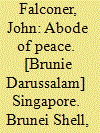

|
|
|
|
|
| Publication |
Singapore, Brunei Shell, 1993.
|
| Description |
208p.hbk
|
| Standard Number |
9813018038
|
|
|
|
|
|
|
|
|
|
|
|
Copies: C:1/I:0,R:0,Q:0
Circulation
| Accession# | Call# | Current Location | Status | Policy | Location |
| 036433 | 959.55/FAL 036433 | Main | On Shelf | General | |
|
|
|
|
| 2 |
ID:
110125


|
|
|
|
|
| Publication |
2012.
|
| Summary/Abstract |
Nearly four centuries of American history have witnessed the evolving conflict between two competing sets of values: a belief that acting on behalf of the common good should guide social and political behavior, and a belief that unfettered individual freedom should dominate political and social life. Tracing this conflict from Puritanism through the American Revolution, the Civil War, the rise of industrialism, the Progressive Era, the New Deal, the Great Society, and the conservative revival of the Nixon/Reagan era, the essay reveals this clash of values as pivotal to understanding the narrative of American history, with contemporary political battles crystallizing just how basic this conflict has been.
|
|
|
|
|
|
|
|
|
|
|
|
|
|
|
|
| 3 |
ID:
091102
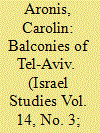

|
|
|
|
|
| Publication |
2009.
|
| Summary/Abstract |
Balconies have an important role in the social life of Tel-Aviv. The article explores different aspects of urban politics and the cultural history of balconies, and in particular sheds light on façade balconies in Tel-Aviv as liminal places between the private sphere and the public arena. Focusing on socio-cultural and architectural characteristics, the study presents, from an historical perspective, changes of style and use of the balconies of Tel-Aviv and examines them as sites of dispute between residents and authorities.
|
|
|
|
|
|
|
|
|
|
|
|
|
|
|
|
| 4 |
ID:
025440
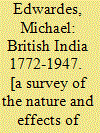

|
|
|
|
|
| Publication |
London, Sidgwick & Jackson, 1967.
|
| Description |
vii, 396p.: ill.hbk
|
|
|
|
|
|
|
|
|
|
|
|
Copies: C:1/I:0,R:0,Q:0
Circulation
| Accession# | Call# | Current Location | Status | Policy | Location |
| 015873 | 954.03/EDW 015873 | Main | On Shelf | General | |
|
|
|
|
| 5 |
ID:
104805
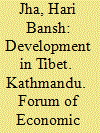

|
|
|
|
|
| Publication |
kathmandu, Forum of Economic Writers, 1988.
|
| Description |
104p.
|
|
|
|
|
|
|
|
|
|
|
|
Copies: C:1/I:0,R:0,Q:0
Circulation
| Accession# | Call# | Current Location | Status | Policy | Location |
| 056051 | 951.506/JHA 056051 | Main | On Shelf | General | |
|
|
|
|
| 6 |
ID:
130808
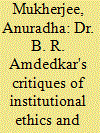

|
|
|
|
|
| Publication |
2014.
|
| Summary/Abstract |
Ethics and morality are the milestones of civilization in the true sense of the term. These concepts again are not static but evolve with greater implications and subtler nuances as humanity strives to grow towards perfection- the ultimate end of existence. ' whether biologically or spiritually. In the context of Indian thought, the traditional, age-old dictums of ethics and morality. having undergone numerous interpretations and changes have experienced a new set of values,' however latent in the traditional interpretation of Dharma or Niri- with the advent of" nationalism, the emergence of a new nation-state and the concurrent vision of human rights. The Constitution of India fully recognizes the moral as at par with the modem, that is, the western ideals of morality in the realization that in the context of Dalit uprising in modern India, the traditional ideals of ethics and morality are to be reviewed. Obviously this shows that what is legal should be ethical and moral or rather. what is ethical and moral tnust have its place in law. It is from this perspective that the modern-day Dalit struggle against injustices, age-old as they are. are to be seen and Dr.B.R. Ambedkar's initiation to this struggle was aimed at bringing ethics and morality to work at the state level, subjugating the Nili forest while lawgivers to take a backseat before the universal laws of morality. To understand Ambedkar's stand on the place of ethics and morality in Hinduism, one must see the reasons that made him strike out at the roots of Hindu social ethics. The Hindu social life was traditionally ruled by Dilemma. Dharma guided a Hindu's'Iife from birth to death by a set of rules strictly laid out for everyone in society. The observation of these rules was morality and the underlying ethics of these duties and rights was ?rst ofall, societal good, i.e., good for 'all. The second part of this ethics was that by observing this social morality, an individual will attain perfection. In accordance with these concepts, the Dharmas/zastras dictate the functions ofthe state and the king. The Nili and Dandanili emanate from one source and with one ideal- that is to maintain the social order by arranging for the speci?c duties of each and every member of society. Consequently. rights came as group rights and institutional rights as laid out in the Dharamshastra'. And over and above everything was the belief in the law of Karma that sanctified the rule of l/Z7I'l7aS/1I'uII7(l, or ones station in life as prescribed by onc's birth. These two essential features of Hindu society made it a highly stratified one so that the passage of' centuries only tightened the rules and the rituals pertaining to these two rules. The solemn and noble hymns of Rigveda. where the philosophy of Vedic seers and poets as the world being one and where everyone was the other's kin. I Va.t'zzdlmibu Kzzrumba/(um )' is the spirit of the ancient Indian Vedic realization. The utmost ideals of human dignity with the universal ethics of righteous behavior and the universal morality of conscientious behavior were preached in their fullest glory. . '
|
|
|
|
|
|
|
|
|
|
|
|
|
|
|
|
| 7 |
ID:
034415
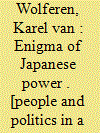

|
|
|
|
|
| Publication |
London, Macmillan, 1989.
|
| Description |
496p.hbk
|
| Standard Number |
0333443217
|
|
|
|
|
|
|
|
|
|
|
|
Copies: C:1/I:0,R:0,Q:0
Circulation
| Accession# | Call# | Current Location | Status | Policy | Location |
| 030693 | 952.048/WOL 030693 | Main | On Shelf | General | |
|
|
|
|
| 8 |
ID:
103925
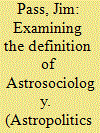

|
|
|
|
|
| Publication |
2011.
|
| Summary/Abstract |
A void has existed within the social sciences for over fifty years since the launch of the first Sputnik satellite in October 1957. This void delineates the boundaries of a missing field, a discipline capable of focusing on the relationship between social life and outer space. It is true that social scientists have pursued space issues over the last thirty years or so. As individuals, they have participated in the areas of search for extraterrestrial intelligence research, astrobiology, space policy, and space history. The strength of astrosociology, however, lies in its formalization of this type of approach into an identifiable field of study, which allows for a more organized and inclusive opportunity for participation. As a starting point, one may express the relationship between social life and outer space as astrosociology. One can define astrosociology as the study of social, cultural, and behavioral patterns related to outer space. The purpose of this article is to provide a general framework for more precise language concerning the definition, scope, character, and future development of astrosociology, while simultaneously attempting to elicit a broader discussion of astrosociology's association to other disciplines. It suggests how the various fields and disciplines associated with astrosociology as a multidisciplinary field can work together to build a missing body of knowledge from their related literatures and contemporary research.
|
|
|
|
|
|
|
|
|
|
|
|
|
|
|
|
| 9 |
ID:
134106
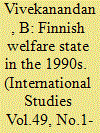

|
|
|
|
|
| Publication |
2014.
|
| Summary/Abstract |
Finland has an advanced welfare state system, which extends social protection for everyone in the country. The system is anchored in a full-employment policy, a steeply progressive taxation system, and a strong, benevolent and resourceful state, endowed with the authority to regulate the economic and social life of people. This system has been established through the institutionalization of various social insurance schemes and schemes for pensions, health care, childcare, free and compulsory education, etc. In the 1990s, the Finnish state experienced an economic crisis, borne out of flawed economic reforms like the deregulation of the financial market and other changes that aimed at hastening Finland's European Union (EU) membership. The crisis forced the government to tighten the preconditions for availing of welfare benefits. Some notable changes made during the crisis have not yet been rescinded even after it ended. Nevertheless, the crisis underlined the value of the welfare state system in helping ordinary people to successfully insulate themselves against any serious hardship during the period. As a result, the system is very popular in Finland. The Finnish welfare system today faces new challenges emanating from globalization, the EU, demographic changes and structural unemployment.
|
|
|
|
|
|
|
|
|
|
|
|
|
|
|
|
| 10 |
ID:
157125
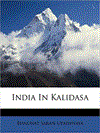

|
|
|
|
|
| Publication |
New Delhi, Life Span Publishers and Distributors, 2018.
|
| Description |
xvi, 385p.hbk
|
| Standard Number |
9789381709771
|
|
|
|
|
|
|
|
|
|
|
|
Copies: C:1/I:0,R:0,Q:0
Circulation
| Accession# | Call# | Current Location | Status | Policy | Location |
| 059287 | 891.2/UPA 059287 | Main | On Shelf | General | |
|
|
|
|
| 11 |
ID:
133299
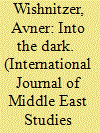

|
|
|
|
|
| Publication |
2014.
|
| Summary/Abstract |
This article analyzes different traditions of nocturnal conviviality in 18th-century Istanbul and demonstrates their importance for social, political, and cultural life. The main argument is that the palace used the night to demonstrate its power in spectacles of light and to cultivate personal relations within the elite, both of which were crucial for a patrimonial government based on face-to-face interaction. Yet, it was exactly the reliance on such interaction that marked the limits of the palace's hold of the night. With the neighborhood gaze blinded by darkness, communal policing lost much of its effectiveness, leaving nocturnal social life largely concealed from the eyes of the authorities. Nighttime therefore offered opportunities for illicit modes of socialization and, at times, for subversive political action.
|
|
|
|
|
|
|
|
|
|
|
|
|
|
|
|
| 12 |
ID:
185286
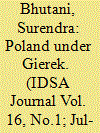

|
|
|
| 13 |
ID:
131015
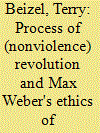

|
|
|
|
|
| Publication |
2014.
|
| Summary/Abstract |
Weber dismissed paci?sm as an inadequate orientation to modern social and political life. However, the ethical and methodological imperative of Gandhi's insistence on active nonviolence contention is illuminated by and consistent with Max Weber's "ethic of responsibility"-marked by both passion and proportion-in the relationship between motivations, means, and ends in social action. Therefore, Weber's insights add clarity Gandhi's nonviolent ethics and methods; Gandhi's nonviolent ethics and methods add clarity to Weber's understanding of responsibility in modern political and social life. This provides a key to understanding active nonviolence and building the (peaceful) future in the process of revolution.
|
|
|
|
|
|
|
|
|
|
|
|
|
|
|
|
| 14 |
ID:
130033
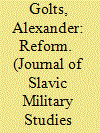

|
|
|
|
|
| Publication |
2014.
|
| Summary/Abstract |
Two years ago president Dmitry Medvedev and Minister Anatoly Serdyukov stated that military reforms are 'practically' complete. It looks premature now. Serdyukov managed to fulfill only 'quantitative' part of reforms. The 'Serdyukov' reforms will follow the path typical of the majority of Russian reforms. They focus on meeting certain formal measures and characteristics (in the case of military reform, this includes the size of the armed forces, the number of units, the new structure and so on) and, at the same time, avoid making decisions that would require radical changes in the country's political and social life.
|
|
|
|
|
|
|
|
|
|
|
|
|
|
|
|
| 15 |
ID:
127804
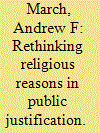

|
|
|
|
|
| Publication |
2013.
|
| Summary/Abstract |
This article intervenes in the debate on the place of religious arguments in public reason. I advance the debate not by asking whether something called "religious reasons" ought to be invoked in the justification of coercive laws, but by creating a typology of (a) different kinds and forms of religious arguments and, more importantly, (b) different areas of political and social life which coercive laws regulate or about which human political communities deliberate. Religious arguments are of many different kinds, are offered to others in a variety of ways, and the spheres of life about which communities deliberate pose distinct moral questions. Turning back to the public reason debate, I argue then that political liberals ought to be concerned primarily about the invocation of a certain subset of religious reasons in a certain subset of areas of human activity, but also that inclusivist arguments on behalf of religious contributions to public deliberation fail to justify the use of religious arguments in all areas of public deliberation.
|
|
|
|
|
|
|
|
|
|
|
|
|
|
|
|
| 16 |
ID:
088117
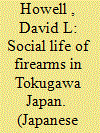

|
|
|
|
|
| Publication |
2009.
|
| Summary/Abstract |
Guns were surprisingly common in the villages of Tokugawa Japan. This article examines the 'social life' of firearms, focusing particularly on the hinterland of Edo. It traces the evolution of institutions governing peasants' possession of guns and examines prevailing conceptions of the uses of firearms. Building on the work of Tsukamoto Manabu, it argues that for much of the period guns were perceived to be farm implements rather than weapons per se: they were used to frighten or kill animals that damaged crops but not in conflicts among people. Starting in the 1840s, however, guns came to acquire an unequivocal character as weapons. This transformation came in response to anxiety over the proliferation of masterless samurai, unregistered commoners, and other disorderly elements, whose activities were seen as undermining the fabric of rural society.
|
|
|
|
|
|
|
|
|
|
|
|
|
|
|
|
| 17 |
ID:
106151
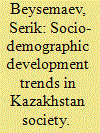

|
|
|
| 18 |
ID:
118905
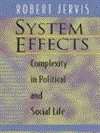

|
|
|
|
|
| Publication |
Princeton, Princeton University Press, 1997.
|
| Description |
p.309
|
| Contents |
B
|
| Standard Number |
0691026246
|
|
|
|
|
|
|
|
|
|
|
|
Copies: C:1/I:0,R:0,Q:0
Circulation
| Accession# | Call# | Current Location | Status | Policy | Location |
| 057194 | 301/JER 057194 | Main | On Shelf | General | |
|
|
|
|
| 19 |
ID:
073295
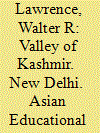

|
|
|
|
|
| Publication |
New Delhi, Asian educational services, 2005.
|
| Description |
478p.: plates, mapshbk
|
| Standard Number |
81200616308
|
|
|
|
|
|
|
|
|
|
|
|
Copies: C:1/I:0,R:0,Q:0
Circulation
| Accession# | Call# | Current Location | Status | Policy | Location |
| 051565 | 954.6/LAW 051565 | Main | On Shelf | General | |
|
|
|
|
| 20 |
ID:
139306
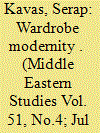

|
|
|
|
|
| Summary/Abstract |
To a social thinker who is used to dealing with macro aspects of sociopolitical phenomena,
the issue of clothing may sound trifling, or at best may be viewed as an insignificant detail of social life and thus be discounted as secondary. However, what are considered mundane issues may themselves be so heavily loaded and may bear such subtle and unique meanings that inattention to them may result in missing some very important insights allowing a much closer analysis of larger issues, such as the experience of modernization, in particular, in a non-western context. As Comaroff and Comaroff rightly put it, ‘Cultural revolutions usually rooted themselves on modest terrain, in simple acts of fabrication, use, exchange. Even the most elaborate social formations arise from such quotidian acts’.
|
|
|
|
|
|
|
|
|
|
|
|
|
|
|
|
|
|
|
|
|